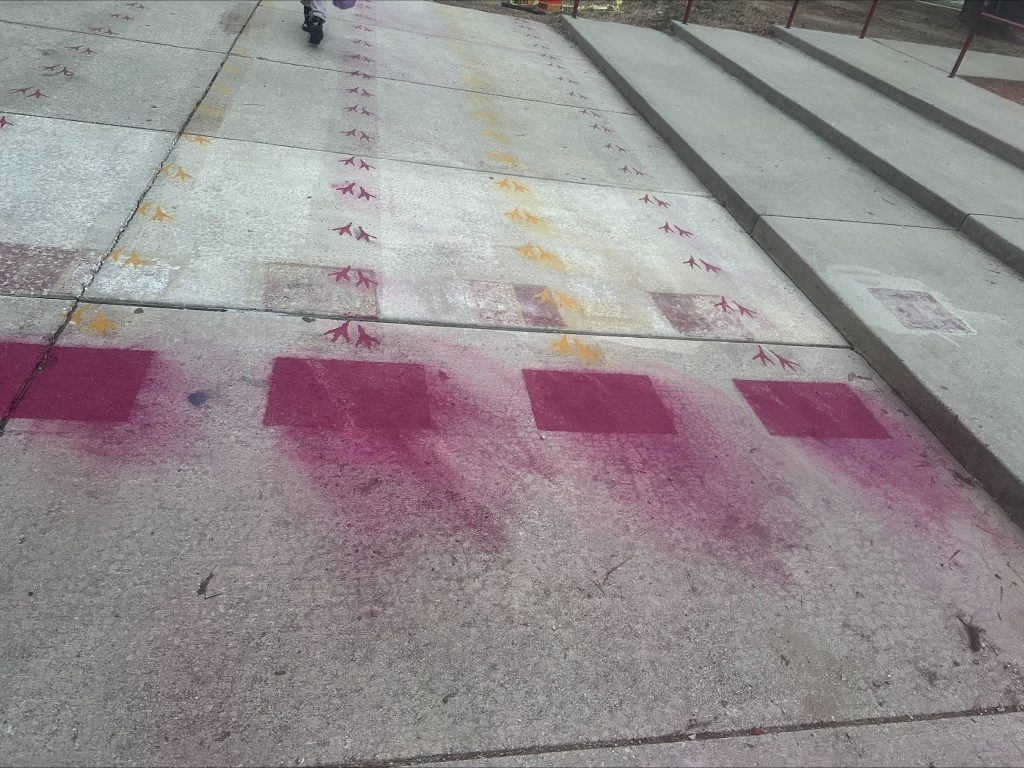by Emily Ralph Servant
We spent months planning our painting party at the school. We found cute hawk print stencils, matched the burgundy and gold of the school colors, and waited for a stretch of warm weather to coincide with school vacation.
We cleaned off years of class numbers that overlapped on the pavement where the elementary school kids lined up. We were not only going to repaint the numbers, but we were going one step further; we planned to paint lines of hawk prints (the school mascot) to show the kids where to line up. For months, we had watched the teachers yelling at the kids at the end of long school days, trying to keep them in straight lines in the tight space. If we could bring some peace to dismissal time, we felt like we were doing God’s work.
The day finally arrived, with temperatures rising into the fifties over New Year’s weekend. It had rained over Christmas break but we had a dry forecast. A bunch of people had offered to help, but when the day came, only two neighbors showed up. Together with my first-grade daughter, the four of us measured, taped, stenciled, and painted. We talked about life, about faith, and about our community.
A few hours later, we stepped back to admire our work. And, boy, did it look good.
My church, Refuge, is shaped around empowering people who want to live like Jesus and with Jesus in our neighborhoods. With the encouragement of Mosaic’s missional lead, Noel Santiago, Refuge has been using the church planting grant we received from the conference to support our members in loving our neighborhoods. Refuge paid for the paint and supplies we needed to spruce up the school and I was excited about this connection between my church expression and my community.
The next day, I got an email from the school/community liaison. She sent me some photos. Despite the forecast, it had rained overnight. Before the paint dried. And all our beautiful paint had run down the sidewalk.

I was frustrated. I was embarrassed. Instead of improving the situation, we had made it worse. And with the cold stretch, it would be months before the weather, the school’s schedule, and my free time would line up again.
Soon afterward, our virtual Refuge gathering was studying the story of Jesus choosing his apostles in Luke 6. The CEB version we read describes how Jesus took his disciples up the mountain, named some of them as apostles, and then brought them back down the mountain, where they stood in front of a large crowd of Jesus’ followers (vs. 12-17). I thought about how I would have felt as one of those newly-named apostles, standing in front of hundreds of people as one who had been chosen to join Jesus in his public ministry.
Jesus—the one who taught so powerfully, healed all the sick, set people free from oppressive spirits, creatively navigated conflict, stood strong in the face of opposition—had chosen me to join him in his work of making the world right again.
And all I have is running paint.
I felt so inadequate. How could I ever live up to this call?
But as we practiced listening prayer in response to this passage, I realized that the big crowd wasn’t looking at me; they were looking at Jesus. Jesus was the attraction. As long as I was pointing people to Jesus, I was enough. Jesus is already present, healing my neighborhood, and I get to be a part of it.
Running paint and all.

Emily Ralph Servant
Emily Ralph Servant is the Leadership Minister for Strategic Priorities for Mosaic Mennonite Conference. Emily has served in pastoral roles at Swamp and Indonesian Light congregations and graduated from Eastern Mennonite Seminary.
The opinions expressed in articles posted on Mosaic’s website are those of the author and may not reflect the official policy of Mosaic Conference. Mosaic is a large conference, crossing ethnicities, geographies, generations, theologies, and politics. Each person can only speak for themselves; no one can represent “the conference.” May God give us the grace to hear what the Spirit is speaking to us through people with whom we disagree and the humility and courage to love one another even when those disagreements can’t be bridged.
